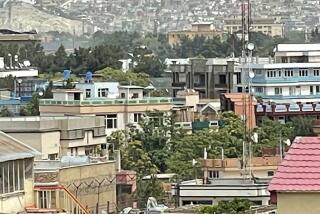Al Qaeda leader vows to free Muslims from U.S. prisons, Guantanamo
- Share via
Al Qaeda leader Ayman Zawahiri has vowed in a video released Wednesday to break out Muslim prisoners from U.S. penitentiaries and the heavily fortified compound for terrorist suspects at Guantanamo Bay, Cuba.
The blustery threat to retaliate for U.S. “crimes” against Al Qaeda warriors was probably inspired by recent attacks on prisons in Iraq, Libya and Pakistan that freed more than 2,000 detainees, many of them allied with the global terrorism network that has been headed by Zawahiri since the 2011 assassination of its founder, Osama bin Laden.
But security at the crude prisons breached in the Middle East by Al Qaeda-aligned suicide bombers over the last week pales in comparison with the U.S. detention sites’ concentric rings of armed guards, concrete walls and electrified, concertina wire-topped fences.
“America’s tyranny, inflicted on the Muslims unjustly imprisoned for 13 years without charge, is a crime that has exposed the lie about freedom, human rights, democracy and people’s rights that America claims,” Zawahiri said in the video, according to a translation by the Agence France-Presse news agency and carried by the France 24 network.
“We pledge God that we will spare no efforts to set them free, along with all our prisoners, on top of them Omar Abdel Rahman, Aafia Siddiqui, Khalid Sheikh Mohammed and every oppressed Muslim everywhere,” Zawahiri said in the video, according to the Associated Press reporting from Baghdad.
The news agency said its authenticity couldn’t be confirmed, but that the video was posted on an Islamist website regularly used to disseminate Al Qaeda messages.
Zawahiri condemned the U.S. military’s force-feeding of hunger-striking detainees at Guantanamo, where the nearly five-month protest against indefinite detention has eased during the Muslim holy month of Ramadan. Earlier this month, 106 of the 168 prisoners were refusing food at the compound on a remote stretch of the U.S. base in southern Cuba.
The military-run detention facilities, modeled after maximum-security prisons in Michigan and Indiana, are guarded by hundreds of U.S. soldiers and sailors. The base is accessible only to Pentagon-vetted passengers on authorized aircraft that land at an airstrip across the heavily patrolled bay. The rocky shore on the Caribbean side of the prison compound is swept by swift currents, defended by gunboats and as menacing to swimmers and small vessels as the waters around Alcatraz in Northern California.
None of the nearly 800 prisoners that have been held at Guantanamo since it opened in January 2002 has ever escaped or been known to attempt a breakout. Cuban revolutionary leader Fidel Castro, who was still in power when the naval base began ferrying in terrorist suspects from secret CIA black sites abroad, promised to return any escapee from the base, which is surrounded by Cuban territory.
Of the three Muslim captives mentioned by Zawahiri, only confessed Sept. 11 mastermind Mohammed is detained at Guantanamo, in Camp 7, the top-secret venue for “high-value detainees.” His four co-defendants in pretrial proceedings stemming from the Sept. 11, 2001, terrorist attacks are also held at Camp 7.
Rahman, known as the “blind sheikh,” is incarcerated at the medical facility of a federal prison at Butner, N.C., serving a life sentence for plotting the 1993 attack on New York’s World Trade Center.
Siddiqui, a Pakistani with a doctoral degree in neuroscience from Brandeis University, is serving an 86-year sentence at a federal prison on a U.S. naval air base in Texas for attempted murder and assault related to collaboration with Mohammed. She is married to Ammar Baluchi, a nephew of Mohammed and one of his co-defendants in the Sept. 11 trial who is also held at Guantanamo.
ALSO:
Afghanistan civilian casualties up sharply this year, U.N. says
Zimbabwe election: Voters line up for poll plagued with doubt
Spain train driver on tape during questioning: ‘I won’t make it’
Twitter: @cjwilliamslat
More to Read
Sign up for Essential California
The most important California stories and recommendations in your inbox every morning.
You may occasionally receive promotional content from the Los Angeles Times.














